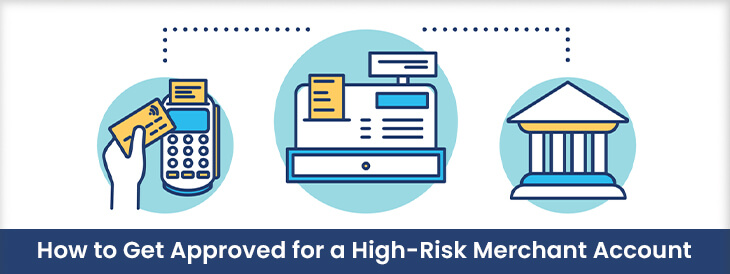How to Get Approved for a High-Risk Merchant Account
How to Get Approved for a High-Risk Merchant Account

Navigating the world of merchant accounts can be particularly challenging for businesses considered high-risk. Whether you’re in the adult industry, e-commerce, travel, or any sector that faces increased scrutiny, getting merchant approval can feel like an uphill battle.
Many traditional banks shy away from providing services to high-risk businesses, leaving them with limited options. However, understanding the specific requirements and the application process can significantly improve your chances of high-risk account approval.
This guide will explore essential strategies and tips for obtaining a high-risk merchant account, helping you secure the payment processing solutions necessary for your business’s success. With the right approach, you can overcome the barriers and establish a reliable payment system that meets your unique needs.
Understanding High-Risk Merchant Accounts
High-risk merchant accounts are specialized payment processing accounts designed for businesses that operate in industries with higher levels of chargebacks, fraud, or regulatory scrutiny. These accounts are often essential for businesses in sectors like adult entertainment, e-commerce, travel, online gaming, and health and wellness products. Traditional banks and payment processors may avoid working with these industries due to perceived risks, which is why specialized high-risk merchant account providers exist.
A key characteristic of high-risk merchant accounts is that they often come with higher fees and stricter terms compared to standard merchant accounts. Providers may require rolling reserves—a percentage of each transaction held in reserve to cover potential chargebacks or fraud. Additionally, approval processes for these accounts are generally more rigorous, requiring extensive documentation and thorough background checks.
Understanding the intricacies of high-risk merchant accounts can empower your business to navigate the application process more effectively. Knowing what to expect in terms of fees, terms, and required documentation can help you prepare adequately and choose the right provider. By meeting these specific requirements and working with experienced high-risk merchant account providers, you can secure the necessary payment processing solutions to support your business’s unique needs.
Some Related Blogs
- The Future of Payment Processing for High-Risk Businesses
- How to Deal With Chargebacks and Fraud in High-Risk Payment Processing
- The Latest Trends in Payment Processing Technology For High-Risk Businesses
- The Impact of Regulations on High-Risk Payment Processing
Preparing Your Business Documents
One of the crucial steps in securing a high-risk merchant account is preparing your business documents meticulously. This process involves gathering comprehensive records that demonstrate the stability and legitimacy of your business. Key documents you will need include your business license, articles of incorporation, and tax returns. Additionally, prepare your financial statements, including profit and loss statements and balance sheets, as these will provide a clear picture of your business’s financial health.
You’ll also need to submit a detailed business plan outlining your operational strategies, target market, and revenue projections. This helps potential providers understand your business model and assess the associated risks. If your business operates online, make sure your website is fully functional, secure, and compliant with all necessary regulations. Be ready to provide documentation related to your compliance with industry standards and regulatory requirements.
Having a transparent transaction history can also work in your favor. Provide records of your previous payment processing activities, including chargeback ratios and sales volumes. The more organized and thorough your documentation, the better your chances of getting merchant approval for your high-risk account. Properly prepared documents not only expedite the application process but also build trust with potential payment processors.
Finding the Right Payment Processor
Choosing the right payment processor is a pivotal step in securing a high-riskmerchant account. Begin by researching providers that specialize in high-risk industries, as they will have the necessary experience and infrastructure to handle your specific needs. Look for payment processors with a solid reputation and positive reviews from other high-risk businesses.
Evaluate the terms and conditions offered by each potential provider, paying close attention to fees, chargeback policies, and reserve requirements. High-risk merchant accounts often come with higher fees, so it’s crucial to understand the cost implications for your business. Additionally, ensure that the payment processor offers robust fraud prevention tools and chargeback management services to help mitigate potential risks.
Customer support is another critical factor. Opt for a payment processor that provides excellent customer service and technical support, ideally available 24/7, to address any issues promptly. Integration capabilities are also important; make sure the processor can seamlessly integrate with your existing systems and platforms.
Finally, seek a payment processor that values transparency and is willing to communicate openly about their approval criteria and any potential challenges you might face. By doing thorough research and considering these factors, you can find a payment processor that aligns with your business’s needs and facilitates smoother high-risk account approval.
Enhancing Your Credit Score
A strong credit score can significantly improve your chances of high-risk account approval. Start by reviewing your credit reports for any inaccuracies and promptly dispute any errors. Consistently paying your bills on time is essential, as payment history is a critical component of your credit score. Reduce your outstanding debts and keep your credit card balances low relative to your credit limits. Diversifying your credit mix—such as having a blend of credit cards, retail accounts, and installment loans—can also positively impact your score.
Avoid opening multiple new credit accounts in a short period, as this can be seen as risky behavior by creditors. Maintaining older accounts in good standing can also boost your score since the length of your credit history plays a role. Regularly monitor your credit score to track your progress and identify any potential issues early.
Implementing these strategies can help demonstrate financial responsibility to potential high-risk merchant account providers, increasing your likelihood of approval. By focusing on enhancing your credit score, you build a stronger financial foundation that makes your business more attractive to payment processors specializing in high-risk industries.
![]()
Email us anytime!
Email customer service 24/7 at info@binarygateways.com
![]()
Call us anytime!
Reach customer care 24/7 at (801) 761-5001
